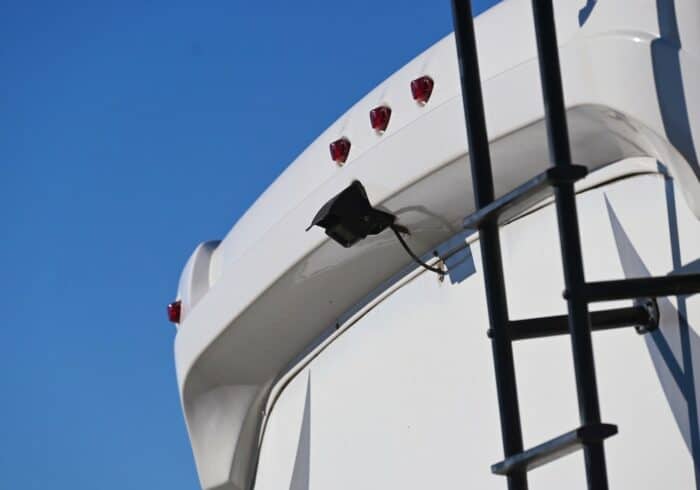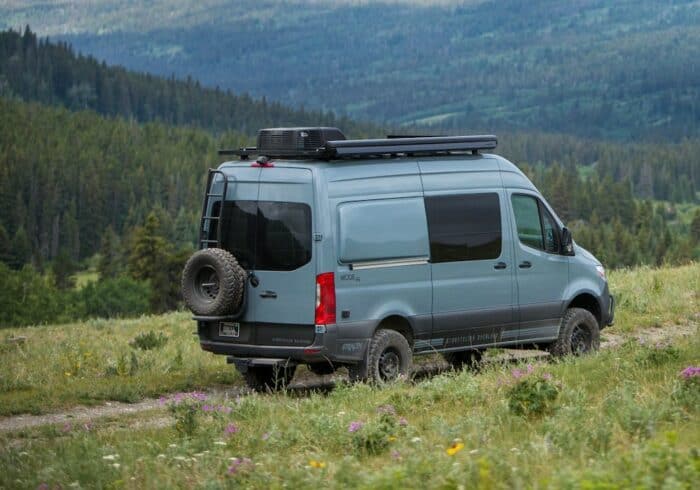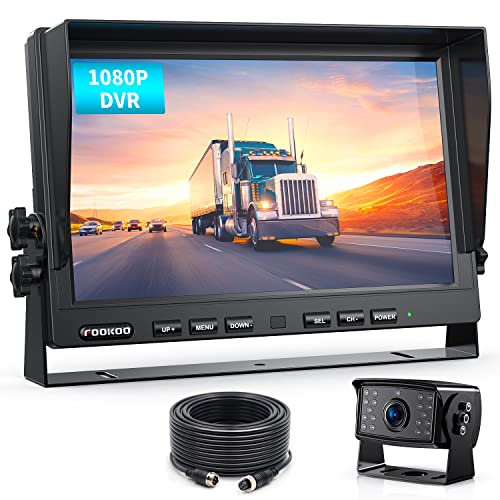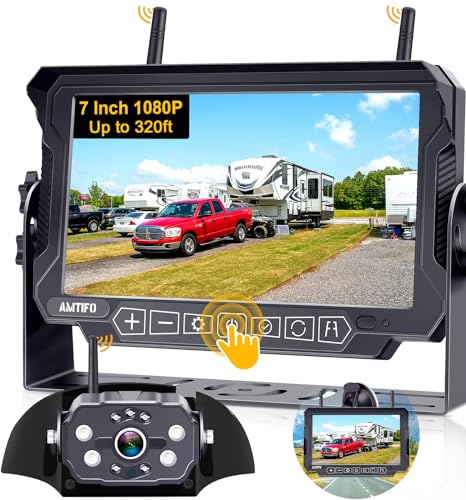What is an RV Backup Camera?
Backup cameras, also called rearview cameras have become an automatic addition to new cars in the automotive world.
Chances are your vehicle already has a backup camera on it. So why not have one on your RV?
RV backup cameras are small, weatherproof cameras that are installed on the back of your RV.
It doesn’t matter if you have a travel trailer, 5th-wheel, motorhome, truck camper, van, or tent trailer. Any kind of RV will work with an RV backup camera.
Related Product: Level your RV is using an App on your phone with the LevelMatePro Wireless RV Leveling System (click to view on Amazon)
Most RV backup cameras being installed today are wireless.
That means they use a wireless signal to transmit video to a monitor that goes inside the cab of your tow vehicle.
Some older RVs, usually motorhomes, have wired RV backup cameras.
Wired RV backup cameras are still mounted to the backside of the RV, but they require a cable to be run all the way from the monitor to the camera.
It’s a lot more work to install a wired RV backup camera, which is probably one of the biggest reasons they aren’t being installed in RVs as much as they used to be.
But there are a few pros to wired when compared to wireless.
In this article, I’ll go through the pros and cons of each kind of RV backup camera. I’ll also give some good options for both kinds.
Hopefully, this comparison will help you decide which one is right for your camper.
See Also: Best Wireless RV Backup Cameras & Systems Reviewed
Wired vs Wireless RV Backup Camera
Wired RV Backup Camera Pros
Solid Connection Between Monitor & Camera
Having a physical wire between the monitor and RV backup camera has the huge benefit of a solid connection between the two.
It won’t matter how fast you are driving or if there’s any kind of signal interference, the video from the camera will always be clear.
No Video Delay
Because of the wire, the video being sent from the camera is going to be live, so you will know what’s happening behind your RV exactly when it happens.
There’s always going to be a slight delay in the video when a camera that’s transmitting a signal is being used, but a wired connection has no delay.
This is much better for using a backup camera for rear observation when driving.
You can use it when making lane changes and keeping an eye on the cars that are right behind you.
If you get a version that has side view cameras it completely eliminates blind spots.
You also won’t have to worry about a video delay that can make it so you don’t see what’s actually there.
Most Budget Friendly
Overall, wired RV backup cameras are the more budget friendly option and the value is also better.
But this does come at a cost. The installation of the wire that has to be run all the way from the camera (or cameras) to the monitor takes a lot of time.
Best for Extra Long RVs & Trailers
A weak signal because of too much distance between the camera and monitor is a problem all wireless RV backup cameras have.
There are ways you can fix it but the most effective method is to use a wired RV backup camera instead.
See Also: How To Stop The Furrion RV Backup Camera From Disconnecting (weak signal fix)
Wired RV Backup Camera Cons
Difficult Install
There are a few things you need to consider before going all in with a wired RV backup camera, and the installation is probably the biggest issue.
The video cables that are included with most of these cameras are not made to endure harsh weather and road conditions.
You will need to find a path to the cab of your vehicle or motorhome that offers the most protection.
There are a few good ways you can do this.
The wire can be run inside the RV. This is usually the best way to go if you are installing one in a van or motorhome.
If you run the wires on the outside make sure you put the parts that are going to be exposed to the sun or road inside a protective sleeve.
Having to find a path for the wire that’s protected can make installation even more difficult and time consuming.
Have to Plug It In
If you’re installing a wired RV backup camera on a travel trailer, 5th-wheel, tent trailer, and any other kind of trailer you will need to plug in the camera every time you hitch up.
It’s not a huge deal breaker to have to do this, since you also need to plug in the trailer anyways, but it’s something to think about.
Limited Options
Since wireless RV backup cameras are the new big thing, the wired versions can be more difficult to find.
There are some excellent options available, that I’ll review and link to later on in this post, but none of the big brands like Furrion or Voyager sell wired versions anymore.
See Also: What Backup Camera Is Your RV or Trailer Pre-Wired For?

Wireless RV Backup Camera Pros
Easy Install
Most RVs being made today come with pre-wire kits for wireless RV backup cameras already installed.
Pre-wired RVs are super easy to set up. All you have to do is get a camera that’s compatible, put it on the mount, and plug it into the already installed power plug.
The monitor goes on the dash and plugs into a 12 volt socket for power.
That’s all it takes to install a wireless RV backup camera on a pre-wired RV.
If your RV isn’t pre-wired it’s still easy to install one yourself.
The only hard part is splicing into a nearby marker light to power the wireless camera and drilling a hole so the wire can connect to the camera.
See Also: How Does A Wireless RV Backup Camera Get Power?
It does take some knowledge about wiring, but it’s pretty basic and a much faster install compared to wired RV backup cameras.
If you don’t have the skills to install a wireless RV backup camera yourself, any RV shop or dealer would be happy to do it for you.
Because the installation is so fast it will most likely be less expensive than having them install a wired one.
Tons of Options
The most popular version of something is usually the one companies are making the most of, and this is very true with wireless RV backup cameras.
There are tons of different versions available with multiple cameras and even some that are marker light camera combos.
The big RV brands like Voyager and Furrion only make wireless options, so if you are a fan of those two companies, you will have to go wireless.
Wireless RV Backup Camera Cons
Signal & Video Issues
Unlike wired RV backup cameras, the wireless versions don’t have a physical connection between the monitor and the camera.
That means the video feed could be interrupted or cut off at any time.
Wind, power lines, radio signals, other vehicles, and even the RV itself are just a few things that can make the video on the monitor fuzzy or gone completely.
If you have an extra long RV or trailer you may need to install more powerful antennas to make sure you always have a strong signal.
Some wireless RV backup cameras are made for backing up only and not for rearview observation because the signal isn’t strong enough for driving speeds.
Video Delay
No wireless camera can offer real time video feed, there will always be some delay.
It might not be much of a delay, but if you are using your camera to check your blind spot when making a lane change you might not be seeing what’s really there.
At high speeds even just one second of delay can be an issue because a faster car can easily go from being behind you to next to you in that time.
For backing at slow speeds, a delay isn’t a huge issue. But for some, it can be annoying, especially if you are trying to back a large RV by yourself.

What Kind of RV Backup Camera Should I Get?
It’s really up to you and your needs when choosing the right kind of RV backup camera.
If you want to use the cameras for monitoring the space around your RV while driving the wired version is going to be the best for that.
People do use wireless RV backup cameras for rear and side view observation while driving, but just make sure you are aware of the video delay that can sometimes hide fast cars.
Some of the lower end wireless RV backup cameras don’t have a strong enough signal to be used while driving.
The wired is also better for extra long RVs and trailers, but you can fix a weak signal on wireless RV backup cameras by replacing the small antennas with bigger ones.
See Also: 5 Things To Know About The Furrion RV Backup Camera
If you don’t want to go through the hassle of running wires through your RV and tow vehicle then the wireless version is a clear winner.
It’s especially better if you have a pre-wired RV that’s ready for a wireless camera.
If you don’t plan on using your RV backup camera when driving and it’s just for reversing then the wireless options are the way to go.
But if you’re on a strict budget the wired versions are cheaper overall.
It’s a tough decision to make but in the end, both versions are going to help you see behind your RV.
It really boils down to how much time you want to spend on installation.
Wired RV Backup Camera Recommendation & Review
There aren’t a ton of wired RV backup cameras to choose from anymore. But the ones I did find are pretty great.
There’s even a DVR option, which in my opinion, is a must have for full-time RVers and long distance travelers.
Here are some of the best wired RV backup camera options.
Last update on 2024-04-24 / Affiliate links / Images from Amazon Product Advertising API
Yakry Wired RV Backup Camera
The Yakry is the most simple and budget friendly wired RV backup camera on the market.
Being simple doesn’t make it a bad option for RVers.
The camera still has all the same features many of the higher end wireless RV backup cameras offer.
The HD camera is waterproof and comes with a mounting bracket. It has night vision, 150 degree wide angle lense, parking guide lines, image flip, and a mirror view.
The included monitor has a 7 inch 1080P HD screen and can connect up to two cameras.
It comes with a windshield and a dash mounting bracket. It’s powered via a 12 volt plug that also powers the camera on the RV.
Included with the camera and monitor are the various brackets needed for installation, a 66 foot cable, and an extension harness with plugs for two cameras.
If you are looking for a great RV backup camera that’s reliable, offers a clear image no matter what, and is budget freindly, the Yakry Wired RV Backup Camera is the way to go.
PROS
- 1080P Image
- Extra Long Video Cable
- Night Vision
- Backing Guidelines
- Image Flip
- No Video Delay
CONS
- 2 Camera Max
- No DVR Recording Feature
Fookoo Recording Wired RV Rearview Camera
For a more advanced wired RV backup camera the Fookoo has a lot of great options.
This version comes with just one camera but you can get a wired 2 or 4 camera version (click to view on Amazon) if you want two side views and a door camera.
The camera has all of the features you need for a great rearview or backing experience.
It’s waterproof, has night vision, a CCD chip, backing guide lines, and an image flip setting.
The best and most important feature of this wired RV backup camera is the DVR recording feature.
Not many RV backup cameras have a recording feature, but the Fookoo 9 and 10 inch monitor versions do.
A 32 GB SD card is included that will record whenever the camera or cameras are turned on.
It records in a constant loop which means when the card is full it will delete the oldest videos and replace them with new ones.
If you’re ever in an accident or are using your RV backup cameras security cameras the DVR feature is invaluable.
Every rearview camera should be able to record and it’s unfortunate that many cameras don’t come with this feature.
See Also: RV Truck & Trailer Towing Capacity – How Much Can I Tow?
Included with the camera and monitor is a 50 foot video cable, a power harness for 2 connecting up to 2 cameras, mounting brackets, and remote control.
One thing about the Fookoo is it doesn’t come with a simple 12 volt plug.
Instead, it comes with a harness you hardwire to your vehicle to power both the monitor and camera.
The red positive wire needs to be connected to the car ACC wire, a yellow positive wire connects to the battery, and a black wire is the ground.
Instructions are included to help with the slightly complicated wiring.
One good thing about hardwiring the monitor and camera is it leaves the 12 volt outlet in the cab free so you can use it for other things and you don’t need to remember to plug it in.
The Fookoo Recording Wired RV Rearview Camera is my top choice for a wired RV backup camera because of the DVR recording feature.
Fookoo also offers a lot of different wired camera combinations to fit the needs of every RV or trailer owner.
PROS
- DVR Recording Feature
- 32 GB SD Card Included
- Multiple Camera Options Available
- 1080P Image
- Night Vision
- Backing Guidelines
- Image Flip
- No Video Delay
CONS
- Must Be Hardwired to Vehicle
- No Windshield Mount
Wireless RV Backup Camera Recommendation & Review
Amtifo Wireless RV Backup Camera
There are a lot of wireless RV backup cameras to choose from, but this one made by Amtifo is one of the best when it comes to signal strength and features.
The camera is waterproof, has night vision, has backing guidelines, image flip, and a wide 150 degree lens.
The monitor has a 1080P 7 inch screen.
It can connect to up to 4 cameras and has two antennas that increase the strength of the connection between it and the cameras.
To power the camera you wire it to one of the running lights on the back of your RV. The monitor is powered via a 12 volt plug.
Amtifo advertises the signal to be strong enough to connect to 320 feet away and at 100 miles per hour speeds.
As far as I can tell it’s been able to keep a strong signal even when installed on long 5th-wheel RVs.
There’s still going to be some video delay because it is wireless, but the video should be clear even when driving at highway speeds.
See Also: Different Furrion RV Backup Camera Kits Compared & Reviewed
There’s a DVR recording feature that loops the video. That means when the memory card is full the old video will delete as new video is recorded.
Note there is no SD card included, you will need to purchase one separately.
One thing you do get with purchase is a Furrion bracket and power cable adapter. It makes it so you can use the Fookoo on an RV that’s pre-wired for a Furrion camera.
If you decide to go wireless the Amtifo Wireless RV Backup Camera is going to be a fantastic choice.
It has a strong signal, records as you drive, can connect up to 4 cameras, and it’s very easy to install compared to a wired RV camera.
PROS
- DVR Recording Feature
- Connect Up to 4 Cameras
- 1080P Image
- Night Vision
- Backing Guidelines
- Image Flip
- Easy Install
- Furrion Camera Mount Adapter Included
CONS
- No SD Card Included
- Slight Video Delay
Have any questions about wired vs wireless RV backup cameras? Leave a comment below.




